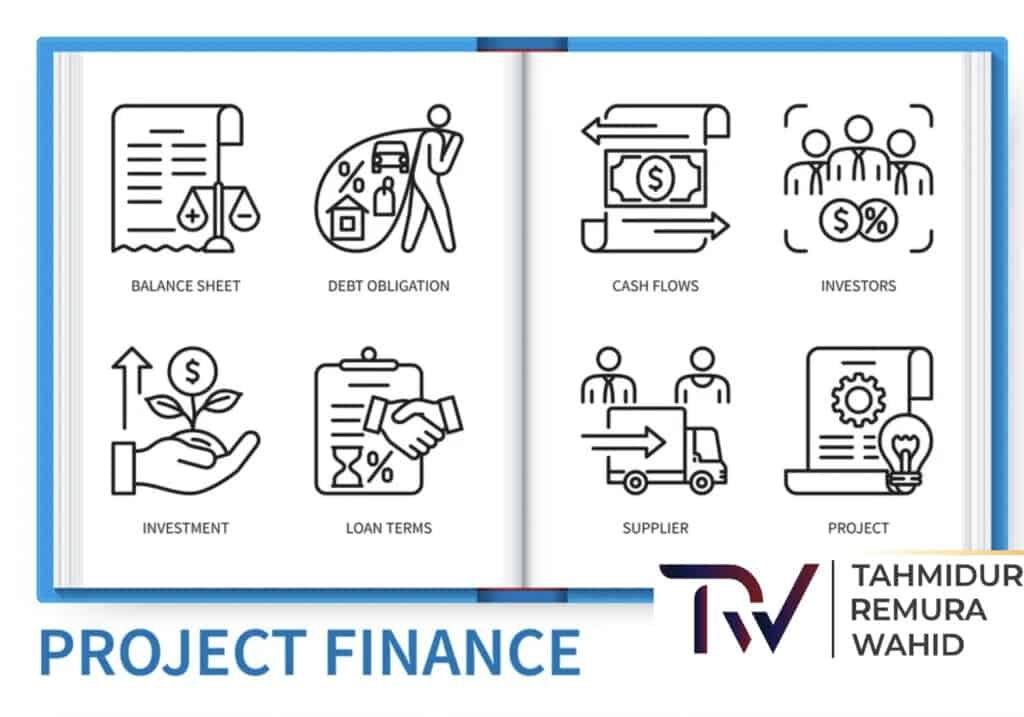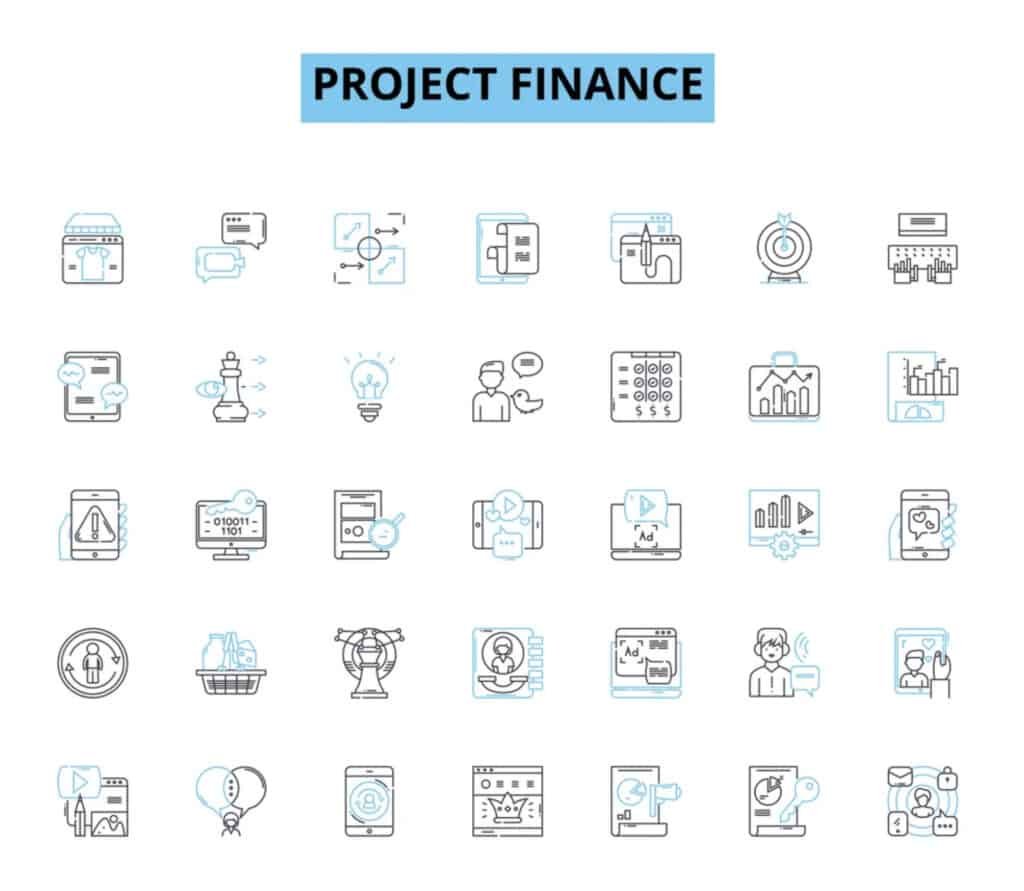Industrial Project Finance in Bangladesh: A Comprehensive Guide
Industrial project finance is a vital component driving economic development and infrastructure growth in Bangladesh.
This financing mechanism plays a crucial role in funding industrial and infrastructure projects, fostering economic growth, and enhancing the country’s competitiveness.
In this comprehensive guide presented on behalf of the Tahmidur Rahman Remura law firm, we will delve deeper into the intricacies of industrial project finance in Bangladesh, including the types of projects financed, regulatory framework, approval requirements, material laws, international treaties, and structuring the financing.

Types of Projects Finance in Bangladesh:
Industrial and infrastructure projects are the primary beneficiaries of project finance in Bangladesh. Industrial projects, predominantly concentrated in the private sector, encompass diverse sectors such as manufacturing, textiles, garments, pharmaceuticals, and more.
These projects fuel the industrial growth of the nation, creating job opportunities and contributing to the overall economic landscape.
On the other hand, infrastructure projects are often undertaken either by the government of Bangladesh itself or through public-private partnership (PPP) models.
These essential projects include toll roads, ports, metro rail systems, liquified natural gas (LNG) terminals, power generation facilities, and energy initiatives.
They address critical infrastructure needs, facilitating efficient transportation, energy distribution, and enhancing the overall quality of life for citizens.
Additionally, project finance is extended to service sectors, such as education, healthcare, telecommunications, and other emerging industries that contribute significantly to the country’s progress.
Regulatory Framework for Project Finance in Bangladesh:
The regulatory framework for industrial project finance in Bangladesh is a crucial aspect that ensures transparency, compliance, and accountability throughout the financing process. Key regulatory authorities involved in project finance approvals include:
- Bangladesh Bank:
As the central bank and the supreme regulatory authority for financial matters, Bangladesh Bank plays a pivotal role in approving project finance applications. It sets guidelines and regulations for both local and foreign currency borrowing and oversees the smooth functioning of the financial sector. - Bangladesh Investment Development Authority (BIDA):
BIDA is the government authority responsible for processing loan applications authorized by Bangladesh Bank. It evaluates and approves project proposals based on their economic viability, financial feasibility, and adherence to regulatory guidelines. - Executive Committee of the National Economic Council (ECNEC):
ECNEC, comprising all members of the Cabinet, approves major development projects, including infrastructure initiatives. It plays a critical role in shaping the nation’s long-term economic development policies and priorities. - Economic Relations Division (ERD):
ERD, under the Ministry of Finance, mobilizes external resources for socio-economic development. It approves sovereign guarantees or framework agreements with foreign lenders or governments, ensuring adherence to international norms and regulations. - Bangladesh Securities and Exchange Commission (BSEC):
BSEC is responsible for approving issues of bonds by private entities and overseeing large-scale share offerings. It ensures compliance with securities laws and regulations, safeguarding the interests of investors and stakeholders.
Regulatory Considerations and Approval Requirements

To facilitate industrial project finance, Bangladesh has established specific regulatory considerations and approval requirements for both local and foreign currency borrowing.
- Local Currency Borrowing:
Local banks and financial institutions can extend loans to local companies in Bangladeshi Taka (BDT). Approved forms of local currency lending include continuous loans (cash credit, overdrafts, etc.), demand loans (e.g., loans against imported merchandise), and fixed-term loans.
The Bangladesh Bank sets a limit on the interest rate spread between deposits and lending (currently around 9%). Lenders must maintain risk-based capital adequacy and adhere to single borrower exposure limits to mitigate risks.
Additionally, lenders must verify borrowers’ credit information from the Credit Information Bureau before authorizing, renewing, or rescheduling loans, ensuring that credit facilities are not provided to defaulters. Credit risk grading is adopted for large loans to assess credit risk effectively. - Foreign Currency Borrowing:
Public sector companies must obtain authorization from ECNEC and approval from ERD for foreign loans.
Any sovereign guarantee or framework agreement with foreign lenders or governments must also be approved by ERD. Under local foreign exchange regulations, public sector companies require permission from the Hard Term Loan Sanction Department of Bangladesh Bank to receive hard term offshore loans. Generally, any interest rate of 4% or more is considered a hard term loan.
For private sector companies, the Bangladesh Bank requires borrowers to obtain permission from BIDA for foreign borrowing. Foreign loans can be raised from internationally recognized sources such as international banks, international capital markets, multilateral financial institutions, export credit agencies, and suppliers of equipment.
However, foreign borrowing is allowed for project financing purposes only and cannot be utilized as working capital. During the approval process, BIDA considers the borrower’s past conduct and the financial viability and profitability of the project.
Specific conditions applicable to foreign borrowing include a maximum 70:30 debt-to-equity ratio, with some sectors like power having an allowance of up to 80:20. The standard interest ratio is up to LIBOR +4%, with an all-in cost ceiling that considers interest and other annualized fees and expenses.
- Shareholder Loans and Bonds:
Generally, shareholder loans for project financing are not allowed, except for short-term bridging purposes. Private sector entities can raise funds through bonds with the prospectus approved by BSEC and underwritten by a merchant bank. - Filing and Registration:
Local borrowing does not require registration. However, for foreign borrowing, the industrial or infrastructure project must be registered with BIDA before submitting the foreign borrowing application. All securities over immovable properties require registration with the office of the sub-registrar in the relevant geographic area.
In addition, securities over any asset of a company must be perfected with the Registrar of Joint Stock Companies (RJSC) within 21 days of the date of creation of the security. Certain conditions may also be imposed under concession agreements.
Material Laws and International Treaties
The legal landscape surrounding industrial project finance in Bangladesh is governed by various material laws and international treaties. Key material laws include:
- Foreign Exchange Regulation Act 1947:
This Act regulates foreign exchange transactions, including foreign borrowing, and sets guidelines for conducting such transactions in compliance with international norms. - Guidelines to Foreign Exchange Transactions:
These are rules formulated by the Bangladesh Bank, outlining the guidelines for foreign exchange transactions and ensuring proper adherence to regulations. - Companies Act 1994:
The Companies Act governs several aspects relevant to project finance, including the perfection of charges on a company’s assets, debt and equity conversions, and procedural compliances related to borrowing and security interest creation. - Transfer of Property Act 1882:
This Act governs the creation and procedures for the enforceability of security over immovable property. - Registration Act 1908:
This Act provides for registration requirements for securities and other rights over movable and immovable properties. - Bankruptcy Act 1997:
This law sets out Bangladesh’s insolvency and bankruptcy legislation that covers companies, partnerships, as well as individuals. - Money Loan Court Act 2003:
This Act provides summary procedures to enforce securities and loan agreements by local financial institutions and some foreign creditors such as the International Finance Corporation, Islamic Development Bank, World Bank, etc. - Code of Civil Procedure 1908 (CPC):
The CPC governs the procedure for civil court proceedings and is used by creditors for recovery proceedings and enforcement of security.

In addition to material laws, several international treaties to which Bangladesh is a party can affect cross-border transactions, including investment-related disputes, recognition, and enforcement of foreign arbitral awards, free trade agreements, comprehensive economic partnership agreements, and preferential trade agreements.
Structuring the Financing in Bangladesh
The successful structuring of industrial project finance in Bangladesh requires careful consideration and coordination among various parties involved in the transaction. Each party plays a distinct role in ensuring the smooth execution of the project and mitigating risks. Below are the main parties involved in an industrial project finance transaction:
- Sponsors:
The sponsors are the owners or ultimate beneficiaries of the project. They initiate the project, bear the initial costs, and assume the risks associated with the venture. Sponsors are often responsible for bringing together the various stakeholders and securing financing for the project. - Project Company/Borrower:
The project company, also known as the borrower, is the entity responsible for implementing the project. It is typically a special-purpose vehicle (SPV) incorporated by the sponsors solely for the purpose of undertaking the project. The SPV isolates the project’s assets and liabilities from the sponsors’ other business activities, minimizing their exposure to potential risks. - Lender:
The lender, often a financial institution or consortium of lenders, provides the funds necessary for financing the project. Lenders assess the project’s feasibility, creditworthiness of the sponsors, and the anticipated cash flow from the project to ensure the repayment of the loan. - Off-taker:
The off-taker is the party, usually a government authority or state-owned enterprise, that enters into a long-term agreement with the project company to purchase the output or services generated by the project. For infrastructure projects, the off-taker is often the government agency responsible for that particular sector, such as the Bangladesh Power Development Board for power generation projects. - Third-Party Guarantors:
Third-party guarantors are entities other than the sponsors who provide guarantees to lenders for the repayment of the loan or fulfillment of the project’s obligations. These guarantees enhance the project’s creditworthiness and reduce the lender’s risk exposure. - Bank Guarantors:
Bank guarantors are financial institutions that issue performance or payment guarantees on behalf of the project company to support the project’s contractual obligations and mitigate potential risks. - Export Credit Agencies:
For projects involving the import of equipment and technology, export credit agencies (ECAs) can provide financing or insurance to exporters and lenders to facilitate cross-border transactions and mitigate commercial and political risks. - Security Trustee:
The security trustee is a resident entity appointed by the lenders to hold the project’s security interests on their behalf. The security trustee ensures that the lenders’ rights and interests are adequately protected and enforced in case of default. - Account Bank:
The account bank is the financial institution where the project company maintains an account to receive loan proceeds and accumulate funds for debt servicing and other project-related expenses. - Inter-Creditor Agent:
In syndicated financing, where multiple lenders are involved, an inter-creditor agent represents the lenders’ interests and facilitates coordination among them. The agent ensures that all lenders are treated fairly and that the syndication process runs smoothly.

Industrial project finance is a crucial driver of economic development and infrastructure growth in Bangladesh. The regulatory framework, supported by various authorities, ensures transparency, compliance, and accountability throughout the project financing process.
Through a comprehensive approach that involves multiple stakeholders, including sponsors, lenders, off-takers, and guarantors, projects are financed, implemented, and managed efficiently, contributing to the country’s sustainable economic progress.
As Bangladesh continues to prioritize its industrial and infrastructure development, industrial project finance will remain a key mechanism for mobilizing domestic and foreign investments.
The collaboration between the public and private sectors, underpinned by sound legal and regulatory principles, will shape Bangladesh’s economic landscape and lead the nation toward prosperity and development.
Additional securities such as sponsor support and guarantee:
In Bangladesh, project financing is primarily conducted on either a non-recourse or limited recourse basis. Non-recourse financings are typically secured by collateral, while limited recourse financing involves additional securities such as sponsor support and guarantees. The following sources of funding are typically available for projects in Bangladesh:
a. State-owned commercial banks:
Bangladesh has six state-owned banks that actively participate in project financing.
b. Specialized banks:
These state-owned banks focus on specific sectors and areas, contributing to project funding.
c. Private commercial banks:
There are 40 local licensed banks and nine licensed branches of foreign banks operating in Bangladesh, providing financing options for various projects.
d. Non-bank financial institutions:
Currently, 34 non-banking financial institutions operate in Bangladesh, offering project financing solutions.
e. Foreign multilaterals and development finance institutions:
These institutions are permitted to finance local projects.
f. Foreign banks/financial institutions:
Foreign entities are allowed to finance projects within Bangladesh.
g. Government funds:
The government provides funds to support Public-Private Partnership (PPP) projects facing short-term economic challenges, including Viability Gap Financing (VGF) and the Bangladesh Infrastructure Finance Fund (BIFF).
Major Types of Financings in Bangladesh:
Several types of financing are commonly adopted in local projects in Bangladesh, including:
a. Buyers’ credit:
Project infrastructure buyers can directly obtain loans from lenders to finance their purchases.
b. Suppliers’ credit:
Suppliers either arrange a loan to finance their credit sales or extend credit to the buyers themselves, with agreed-upon mark-ups.
c. Lease finance:
This option is widely used in the local market, wherein a leasing company leases equipment under financial or operational leases.
Cross-border lease finance is structured as a supplier credit. d. Islamic finance: Islamic financing is gaining popularity in Bangladesh, especially for acquiring high-cost equipment and machinery. Common arrangements include sale and leasebacks (Ijarah), musharaka leasing, one-step murabaha, two-step murabaha, and commodity murabaha.

Advantages and Disadvantages of Project Financing:
Project financing offers several advantages for sponsors and lenders:
Advantages:
a. Risk-sharing: Project financing enables sponsors to share project risks with other stakeholders through security arrangements and contractual agreements.
b. Cash flow management: Lenders can manage free cash flow after operational expenses and statutory payments, leading to a lower cost of capital compared to equity.
c. Lower cost of capital: In the long term, the cost of capital is generally lower compared to the cost of equity.
d. Limited liabilities: A special project vehicle helps sponsors limit their liabilities in project financing.
Disadvantages:
a. Complexity:
Project financing deals are complex due to the need to structure multiple contracts negotiated by all parties involved.
b. Higher transaction costs:
The complexity of project financing leads to higher transaction costs, including legal expenses, tax, and preparation of ownership and loan documentation.
Corporate Vehicles for Project Financing:
In Bangladesh, limited liability companies are typically used for project financing due to various reasons:
a. Foreign companies:
Foreign companies can implement industrial/infrastructure projects in Bangladesh as sponsors through a limited liability company.
b. Local entrepreneurs:
Limited liability companies are preferred by local entrepreneurs for their limited liability. c. Appropriate for non-recourse or limited-recourse financing.
Typical Documents in a Project Financing Transaction:
Several essential documents are involved in a project finance transaction in Bangladesh, including:
a. Termsheet:
A summary of the key terms and conditions of the financing arrangement.
b. Facility agreements: Agreements defining the terms of the financing provided by lenders.
c. Security agreements: Contracts outlining the forms of security granted to lenders.
d. Inter-creditor agreements: Agreements among multiple creditors defining their respective rights and priorities.
e. Account bank/escrow agreements: Agreements governing the use of accounts or escrows for fund management.
f. Cost over-run/sponsor support agreements: Agreements where sponsors pledge to support the project financially in case of cost overruns.
g. Guarantees: Agreements providing additional financial support and protection to lenders.
h. Direct agreements: Agreements between lenders and project parties, ensuring lenders’ direct access to project cash flows and collateral.
Forms of Security in Project Financing:
The main forms of security used in project financing in Bangladesh include:
a. Mortgages: Commonly used for immovable assets such as land and buildings.
b. Fixed and floating charges: Fixed charges grant control over assets, while floating charges allow the chargee to deal with charged assets until crystallization.
c. Pledge of shares: Shareholders can pledge company shares in favor of lenders.
d. Corporate guarantees: Shareholders and third parties can provide guarantees for loans.
e. Bank guarantees: Separate approval from the Bangladesh Bank is required for bank guarantees.
f. Liens: Strictly defined and governed by relevant statutes and conventions.
g. Assignment of receivables: Common for taking security over contractual rights.
Insurance Arrangements for Projects in Bangladesh:
Insurance is a crucial aspect of project financing in Bangladesh, providing protection against various risks that projects may encounter. Common insurance arrangements for projects in the country include:

a. All-risk insurance for construction:
This insurance covers the engineering, procurement, and construction (EPC) contract during the construction phase, protecting against various risks during the project’s implementation.
b. Burglary, natural disaster, and fire insurance:
These insurances protect against losses caused by burglary, natural disasters, and fire incidents, providing additional security to project assets and infrastructure.
c. Third-party liability insurance:
Projects often carry third-party liability insurance to protect against claims from third parties in case of property damage, bodily injury, or other liabilities arising from the project’s activities.
d. Employer’s liability insurance:
This insurance covers liabilities arising from workplace-related injuries or accidents, ensuring protection for employees and laborers involved in the project.
Lenders’ Protection Concerning Project Insurance:
In project financing, lenders have a vested interest in ensuring adequate insurance coverage for the project’s various elements. To protect their interests regarding project insurance, lenders typically adopt the following measures:
a. Beneficiary of project insurance:
Lenders often nominate themselves as the principal beneficiary of the project insurance policies. This allows them to have direct access to insurance proceeds in case of any covered incidents.
b. Compliance monitoring:
Lenders may require borrowers to provide regular updates on insurance coverage and policy renewals to ensure continuous protection throughout the project’s duration.
c. Escrow arrangements:
In some cases, lenders may set up escrow accounts to hold insurance proceeds. This ensures that the funds are available for necessary project repairs or replacements in case of an insured event.
d. Verification of coverage:
Lenders may conduct periodic checks to ensure that the insurance policies meet the required coverage levels and address potential risks adequately.
e. Review of policy terms:
Lenders carefully assess insurance policies to ensure that the coverage aligns with the project’s specific risks and liabilities.

Mechanisms to Protect Security Interests:
Security interests must be perfected within the prescribed period with the relevant authorities. Subsequent interest acquirers are deemed to have notice of the security from the date of its perfection.
Subsequent mortgages or charges require approval from the prior chargee or mortgagee, but subordinated or pari-passu charges can be created with prior approval.
Public Private Partnerships (PPPs) in Bangladesh:
Until 2010, Bangladesh lacked a specific PPP framework. However, in 2010, the government introduced the Policy and Strategy for Public-Private Partnership to promote private sector participation in infrastructure development. This move aimed to address the challenges of funding and executing large-scale projects while leveraging private sector expertise and efficiency.
To support the PPP process and infrastructure development in Bangladesh, the government enacted several regulations and guidelines:
- Procurement Guideline for PPP Projects 2016:
The Procurement Guideline provides a framework for transparent and competitive procurement processes for PPP projects. It ensures that project contracts are awarded through fair and open procedures, promoting accountability and reducing the risk of corruption. - Guidelines for Unsolicited Proposals 2016:
The Guidelines for Unsolicited Proposals allow private sector entities to submit project proposals to the government for consideration. These proposals are evaluated based on their feasibility, economic and social benefits, and alignment with national development priorities. Successful proposals may lead to PPP project development. - Guideline for Viability Gap Financing for PPP Projects 2012:
The Guideline for Viability Gap Financing outlines the mechanism through which the government provides financial support to PPP projects that have high economic and social viability but lack complete financial viability. Viability Gap Financing can be in the form of a capital grant or annuity payment. - Guideline for PPP Technical Assistance Financing 2012 & Scheme for PPP Technical Assistance Financing 2012:
The government offers technical assistance financing to support the preparation and development of PPP projects. These guidelines and schemes aim to strengthen project preparation and enhance the overall viability of projects. - PPP Screening Manual:
The PPP Screening Manual provides guidance on project screening and selection criteria for potential PPP projects. This process helps prioritize projects with significant development impact and ensures that viable projects receive attention.

Financing PPP Projects in Bangladesh:
PPPs in Bangladesh are typically financed through a combination of funding sources, including multilateral institutions, development finance institutions, and private commercial banks. While the government may not provide payment guarantees for PPP projects, it does play a role in supporting financing through various mechanisms:
- Viability Gap Financing (VGF):
As mentioned earlier, VGF is provided to projects with high economic and social viability but uncertain financial viability. The government’s financial support enhances the feasibility of these projects and encourages private sector participation. - Infrastructure Financing:
Specialized financial institutions like the Bangladesh Infrastructure Finance Fund (BIFF) and Infrastructure Development Company Limited (IDCOL) provide financing facilities for PPP projects in the form of debt or equity. The government may participate in such financing arrangements through budget provisions. - Financing against Linked Components:
The government may consider financing and implementing linked activities, such as land acquisition, rehabilitation, provision of utility services, and construction of approach roads. These complementary activities contribute to the overall success of the main PPP project.
Security and Guarantees in PPP Projects:
In PPP projects, concessionaires (private entities) may be allowed to give security to lenders over their interests in the project company, subject to approval from the grantor (government). This security allows lenders to have recourse to the assets of the project company in case of default, providing them with an additional layer of protection.
Social, Ethical, and Environmental Issues:
Social and ethical issues play a significant role in project financing in Bangladesh. The country has ratified the UN Convention against Corruption and has enacted specific laws to address corrupt practices, money laundering, and human rights abuses. Fair practices across all spheres of social, economic, and political activities are ensured through various laws, including the Prevention of Corruption Act, Money Laundering Prevention Act, and Right to Information Act.
Additionally, environmental concerns are addressed through adherence to the Environmental Policy and Bangladesh Environment Conservation Act. Compliance with international guidelines like the IFC Performance Standards and Equator Principles is also required to meet environmental and social requirements.

Tax Holidays and Incentives for Foreign Investment in Projects:
Foreign investment plays a crucial role in the development of infrastructure projects in Bangladesh. To attract foreign investors, the government offers various tax holidays and incentives. Let’s explore some of these incentives and how they encourage foreign investment in the country:
- Tax Holidays for Thrust Sectors and Infrastructure Projects:
The government provides tax holidays for industrial undertakings and physical infrastructure facilities established in thrust sectors. Thrust sectors refer to industries that have significantly contributed to the country’s industrialization. Additionally, industries set up in Export Processing Zones (EPZs) are also eligible for tax holidays. The duration and extent of the tax holidays vary based on the location of the project and the type of industry. - Accelerated Depreciation:
Industrial undertakings not benefiting from tax holidays can take advantage of accelerated depreciation allowances. This allows them to claim higher depreciation in the early years of the project, reducing their taxable income and, consequently, their tax liability. - Concessionary Duty on Imported Capital Machinery:
Industries with an annual turnover below a certain threshold may benefit from a concessionary import duty rate of 3% on capital machinery and spares. This measure reduces the cost of setting up the project and enhances the attractiveness of foreign investment. - Incentives for Export-Oriented Industries:
Export-oriented industries enjoy a range of incentives to boost their competitiveness in the global market. These incentives include duty-free import of capital machinery and spares, bonded warehousing, access to loans and funds for export promotion, cash incentives and export subsidies, and more. - Double Tax Avoidance Agreements (DTAs) and Bilateral Investment Treaties (BITs):
Bangladesh has entered into DTAs with several countries and BITs with various other nations to avoid double taxation of income and protect foreign investments. These agreements provide certainty and predictability to foreign investors, assuring them of fair treatment and non-discrimination. - Power and Energy Fast Supply Enhancement (Special Provision) Act 2010 (PEFSE):
The PEFSE Act empowers the government to quickly deal with and accept solicited or unsolicited proposals in the power and energy sectors on an emergency basis. It allows the government to enter into arrangements with companies bypassing the usual procurement processes. Moreover, it indemnifies the government against any legal proceedings relating to the award of contracts under the PEFSE.
Foreign Currency Accounts:
While opening and operating onshore and offshore foreign currency accounts are generally prohibited without approval from the Bangladesh Bank, there are exceptions for specific projects. For instance, under the private power generation policy, private power generation companies have been granted the right to open and maintain onshore foreign currency accounts.

Dividend Repatriation and Shareholder Loans:
There are no restrictions on the payment of dividends or repayment of shareholder loans to a foreign parent company. However, for the repayment of shareholder loans, prior approval from the Bangladesh Bank is required.
Choice of Law and Jurisdiction
Foreign Law: When parties enter into a project contract or financing agreement, they have the option to choose foreign law as the governing law for the contract. The Bangladesh courts will uphold such a choice of foreign law, provided the intention to do so is clearly expressed in the contract. This decision was reinforced by the precedent set in PLD 1964 Dacca 637, which establishes that the expressed intention of the contractual parties regarding the law governing the contract overrides any other presumption.
Jurisdiction: If a project contract or financing agreement designates a foreign court as having exclusive or non-exclusive jurisdiction, the Bangladesh courts will respect this choice. In such cases, the Bangladesh courts will not exercise jurisdiction over contractual disputes unless all parties involved in the dispute agree to submit to the jurisdiction of the Bangladesh courts. However, it’s worth noting that the Bangladesh courts may assume jurisdiction in specific cases where they have exclusive jurisdiction, such as labor disputes.
Enforceability of Waivers of Immunity
In the context of international contracts that do not contravene local policy and are otherwise valid and binding, Bangladesh courts recognize waivers of sovereign immunity. Additionally, for disputes arising out of commercial contracts, the Bangladesh courts accept the common law doctrine of restrictive immunity, which has been adopted by the English courts.
Recognition of Foreign Arbitral Awards and Court Judgments
Foreign Money Judgment: Under the Code of Civil Procedure 1908, a foreign money judgment can be enforced in Bangladesh within six years from the date of the judgment, subject to court approval for longer durations. To be enforceable, the foreign judgment must fulfill several requirements, including being conclusive and given on the merits of the case, pronounced by a court of competent jurisdiction, and capable of enforcement in the original court.
It must not have been obtained through fraud, be contrary to public policy or applicable laws of Bangladesh, or sustain a claim based on a breach of a law in force in Bangladesh. Furthermore, there should be no pending or possible appeal against the judgment in the original court.

Foreign Arbitral Award: The recognition and enforcement of foreign arbitral awards are subject to certain grounds in Bangladesh. The courts may decline to enforce a foreign arbitral award if a party to the arbitration agreement was under some incapacity, if the arbitration agreement is not valid under the agreed law, or if the party against whom the award is invoked was not given proper notice or an opportunity to present their case.
The award may also be denied enforcement if it contains decisions on matters beyond the scope of the submission to arbitration, except for the part related to the submitted matters. Moreover, the composition of the arbitral tribunal or the arbitral procedure should be in accordance with the parties’ agreement and the law of the country where the arbitration took place.
Enforcement can also be denied if the award is not yet binding on the parties, has been set aside or suspended by the competent authority in the country where it was made, or if the subject matter of the dispute is not capable of settlement by arbitration under the law of Bangladesh, or if the recognition and enforcement would be contrary to public policy.
Recent Legal Developments in Project Finance
As of now, there are no current proposed legal reforms impacting project finance in Bangladesh. However, the landscape of local project financing has seen a new addition in the form of Export Credit Agency (ECA) backed finances. The Bangladesh Investment Development Authority evaluates projects based on its prior payment requirements for the ECA premium, leading to two primary disbursement methods: direct disbursement and reimbursement.
Hire the best law firm for Project finance in Bangladesh
Navigating international projects and finance in Bangladesh requires a keen understanding of the country’s legal framework. Parties can choose foreign law as the governing law for contracts, and the courts respect such choices.
Additionally, waivers of immunity are enforceable in specific circumstances, and the recognition of foreign arbitral awards and court judgments follows set criteria. Staying up-to-date with legal developments is essential, particularly in project finance, where ECA-backed finances are becoming an important consideration. As Bangladesh continues to engage in global business ventures, consulting with legal experts is vital to ensure compliance and successful outcomes in cross-border transactions.
Tahmidur Rahman Remura Wahid Associates represents a variety of high-profile clients operating in Bangladesh to carry out specific projects such as power plants, roads and motorways, and so on. They frequently require financing from many financial institutions, and our lawyers assist clients in creating the relevant documentation as well as advising them on any legal difficulties that may develop as a result of such transactions. Tahmidur Rahman Remura Wahid Associates Associates also aids clients by supplying them with lawyers who negotiate with financial institutions on their behalf.
GLOBAL OFFICES:
DHAKA: House 410, ROAD 29, Mohakhali DOHS
DUBAI: Rolex Building, L-12 Sheikh Zayed Road
LONDON: 1156, St Giles Avenue, 330 High Holborn, London, WC1V 7QH
Email Addresses:
info@trfirm.com
info@tahmidur.com
info@tahmidurrahman.com
24/7 Contact Numbers, Even During Holidays:
+8801708000660
+8801847220062
+8801708080817
